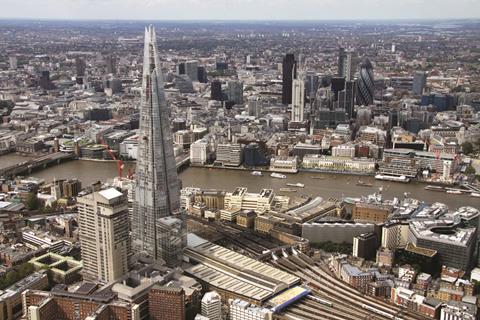With no more Shards on the horizon, how will Mace keep moving upwards? The firmŌĆÖs chief executive explains

Love it or loathe it - and the Shard has sharply divided opinions - most can agree that the latest iconic addition to LondonŌĆÖs skyline is a marvel of modern construction. All the more so when you recall that for Mace, the ShardŌĆÖs main contractor, it was not only its first tower, but its first major fixed-price project.
Mace chairman and chief executive Stephen Pycroft smiles when this is pointed out: ŌĆ£It was a big coup,ŌĆØ he says. ŌĆ£People were wondering whether Mace was a construction manager, a consultant, a project manager - and we had been doing contracting to a lesser degree - then, all of a sudden, the Shard projected us into the limelight.
ŌĆ£People didnŌĆÖt think we could do it but itŌĆÖs been delivered in style. No longer can people say: ŌĆśMace arenŌĆÖt willing to take some riskŌĆÖ. Overnight we quashed that comment and lifted Mace into the very top of the premier league of contractors.ŌĆØ
Notwithstanding the current problems on ITVŌĆÖs new Coronation Street studio, few would dispute that. For a firm that was, not so many years ago, known mainly for construction management, it is now in the running for many of the top London contracting jobs. Against the backdrop of financial crisis and recession, it has enjoyed 75% growth in turnover since 2007 - an average of 17% per year to 2010 - and was the M in CLM, successfully delivering the ┬Ż6.8bn build programme for the Olympic Delivery Authority alongside CH2M Hill and Laing OŌĆÖRourke.
But with revenue growth slowing to 9% in 2011, the Shard all but complete, and the Olympic Games transformed from a construction project into a sporting spectacle, there are questions over MaceŌĆÖs future trajectory. Exactly how can the firm continue to grow in the current environment? What does the future hold for Pycroft, who steps down as chief executive next year? And what kind of firm is Mace, exactly?
Delivery in many guises
ŌĆ£I like to think of us as a constructor,ŌĆØ is PycroftŌĆÖs answer to the last question.
This, he says, means being able to deliver for a client ŌĆ£in whatever guise he wantsŌĆØ. ŌĆ£Whether in construction management, contracting in any way shape or form, weŌĆÖve got the capability, the expertise, and the balance sheet to deliver it,ŌĆØ he says.
But, Pycroft adds, for now being a ŌĆ£constructorŌĆØ largely means being a main contractor on fixed-price jobs.
The firmŌĆÖs results for 2011, exclusively revealed in ║├╔½Ž╚╔·TV last month, showed that construction revenue comprised 73% of the firmŌĆÖs turnover - up 9% from 2010 to ┬Ż681m. In comparison, consultancy work comprised 16% of turnover and international revenues - largely programme management work - 11%.
Pycroft says his main disappointment in recent years is a slower than expected growth in consultancy work - which rose 5% to ┬Ż145m in 2011. He puts this down to the impact of the economic crisis, with clients able to ŌĆ£turn off the tap very quickly, whereas they canŌĆÖt with constructionŌĆØ. Pycroft says he would like to see consultancy revenue rise to around 30% of total turnover and the firm plans to target large programme management contracts, both in the UK and overseas, such as the ┬Ż72m deal to deliver infrastructure works in Qatar that it won in May as part of a joint venture with EC Harris.
Mace will also look at bigger water and waste-to-energy programmes, as well as expanding into defence, with the firm expressing an interest - in partnership with Telereal Trillium - in the Ministry of DefenceŌĆÖs ┬Ż400m contract for a strategic partner to manage the defence estate. ŌĆ£ThatŌĆÖs a big programme of work, and we believe we have the expertise and capabilities to deliver it well,ŌĆØ Pycroft says.
The firm has also expanded into the US, opening a new project and programme management, cost consultancy and facilities management business in New York and Atlanta. Pycroft says the expectation is that the US business will grow in a ŌĆ£very slow mannerŌĆØ - around 10-20% over the next three to four years - with the focus on attracting ŌĆ£good quality clientsŌĆØ and ensuring ŌĆ£our reputation is goodŌĆØ.

Growth - but not quite as fast
Pycroft says the slight tailing off in growth in turnover in 2011 - a rise of 9% to ┬Ż928m compared with 17% the previous year - was a consequence of the downward pressure on margins and ongoing difficult market conditions, with a handful of projects delayed as clients struggled with finance.
But the firm has still enjoyed 75% growth in turnover since 2007 and Pycroft insists it is definitely on track to break through the ┬Ż1bn turnover ceiling this year. It is now targeting a further 40% growth by 2015, with projected revenue of ┬Ż1.3bn.
This, he says, will largely be achieved through the construction side of the business, which will take on a ŌĆ£bigger and bigger proportion of the companyŌĆÖs turnoverŌĆØ. He says a strong pipeline of commercial and residential work within London will soak up the Shard team.
ŌĆ£Our pipeline in and around central London is good - itŌĆÖs as strong now as itŌĆÖs been over the last three or four years, if not stronger. The trouble is outside the M25 where there are very few projects going on and very few major programmes to be won.ŌĆØ
Nearly three-quarters of MaceŌĆÖs business remains in London and Pycroft says this is unlikely to change in the near future.
ŌĆ£We donŌĆÖt see the necessity to go chasing construction work abroad, with a bigger risk in new markets, especially when we can see a pipeline of work here that can still service our growth expectations in the future.ŌĆØ
But he concedes that, in the longer term, the firm will have to look overseas if it is to achieve its ambitions for growth. ŌĆ£I think we will have to export our construction expertise abroad into some areas of low-risk construction. I think thatŌĆÖs the only way - we canŌĆÖt survive just within the M25. WeŌĆÖre going to have to start specifically targeting places where we can start doing construction outside the UK,ŌĆØ he says.
No new Shards
But for now, given the London-focus of its construction business, the firm is unlikely to be building a new Shard (pictured above) any time soon. ŌĆ£I donŌĆÖt think there are going to be many more towers built in London for now and we arenŌĆÖt going to rush across to build another one in Moscow or somewhere else and take undue risks,ŌĆØ Pycroft says.
ŌĆ£ItŌĆÖs nice to build an iconic building and itŌĆÖs nice to change the London skyline but thereŌĆÖs no need for us to get carried away by our own egos and go chasing around the world trying to deliver another Shard. The aim is to build a nice, solid, sustainable business and if that means we donŌĆÖt build another Shard, then IŌĆÖll be disappointed - but thatŌĆÖs life.ŌĆØ
The firm is looking to expand into infrastructure work - and Pycroft says the recent completion of the Thames cable car was about ŌĆ£putting up a flagŌĆØ. ŌĆ£We wanted to show that Mace can do big infrastructure projects - not mega ones - but big ones and therefore create a name for ourselves.ŌĆØ
Pycroft says he wants infrastructure revenue - currently around ┬Ż80m of turnover and about 12% of MaceŌĆÖs construction business - to rise to ┬Ż150m by 2013, but acknowledges that it is a tough market to break into. ŌĆ£Will we ever do a Bond Street or a Tottenham Court Road [Crossrail station project]? Not in the next three, four, or five years. Are we ever going to do a M25 road widening? I donŌĆÖt think so - but for unique projects where clients want something a bit different, they will come to Mace,ŌĆØ he says.
As a private firm - and in a climate of consolidation - MaceŌĆÖs success has inevitably made it the subject of takeover speculation, and there have been approaches, Pycroft says. But he insists the firm is not for sale, adding that its independence gives it an edge. ŌĆ£The people involved in the business decide on the direction and if we have to change because of the economic climate than we have to change and we donŌĆÖt need to have a bureaucratic debate or discussion about it. ItŌĆÖs just, ŌĆśletŌĆÖs change tackŌĆÖ,ŌĆØ he says.
The aim is to build a solid, sustainable business and if that means we donŌĆÖt build another Shard, then IŌĆÖll be disappointed - but thatŌĆÖs life
ŌĆ£Most developers like to deal with people who can make decisions on behalf of the business. The top three contractors we would probably name - Laing OŌĆÖRourke, Sir Robert McAlpine and Mace - are all private companies and are all people that top developers can go to and get an answer without having to telex back or email back 12,000 miles to get a decision.ŌĆØ
And what of PycroftŌĆÖs own future? The chief executive and chairman is set to hand over the reins to deputy chief executive Mark Reynolds in the first half of 2013 - a firm date has yet to be set - but Pycroft will remain in place as chairman. He admits the final details of how the handover will work have not been worked out, but he says he will have a ŌĆ£roving roleŌĆØ and will still be ŌĆ£hands onŌĆØ.
ŌĆ£It will give me more freedom to be involved with clients and get stuck into projects and allow Mark to run the day-to-day business,ŌĆØ he says. ŌĆ£IŌĆÖm still expecting to be fully involved. IŌĆÖm not disappearing into the horizon.ŌĆØ


























No comments yet